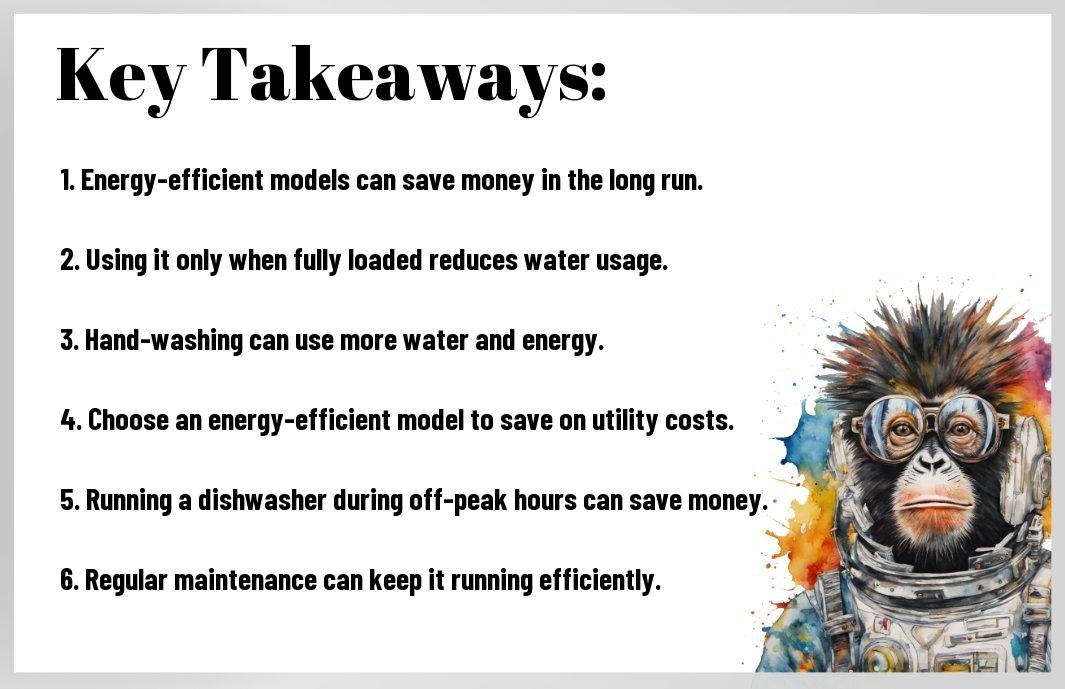Are you debating whether to invest in a dishwasher for your home, but concerned about the potential cost? Contrary to popular belief, using a dishwasher can actually save you time, money, and energy in the long run. While the upfront cost of purchasing a dishwasher may seem daunting, the convenience and efficiency it provides can outweigh the initial investment. In fact, according to a study by the Environmental Protection Agency, hand washing your dishes can use up to 27 gallons of water per load, while a dishwasher uses an average of 3 gallons. Additionally, modern energy-efficient dishwashers consume less water and energy than hand washing, ultimately leading to lower utility bills. With proper maintenance and usage, a dishwasher can be a cost-effective and environmentally friendly option for keeping your kitchen clean and your wallet happy.
Key Takeaways:
- Dishwasher energy consumption: Dishwashers can be energy-efficient when used properly.
- Water usage: Dishwashers generally use less water than hand washing, making them cost-effective in the long run.
- Detergent and rinse aid costs: The cost of detergent and rinse aid for dishwashers should be factored into the overall expense.
- Impact on utility bills: While initial costs may be high, the impact on utility bills may be less significant than anticipated.
- Time and convenience: Using a dishwasher can save time and provide convenience in a busy household.
- Long-term savings: Investing in a high-quality, energy-efficient dishwasher can lead to long-term cost savings compared to hand washing.
- Maintenance and repair costs: Consider the potential for maintenance and repair costs when evaluating the overall expense of using a dishwasher.

The Cost Elements of Using a Dishwasher
Even though dishwashers offer convenience, the cost of using one can be a concern for many homeowners. Understanding the various cost elements involved in using a dishwasher can help you make an informed decision about whether it’s an expensive appliance to have in your home.
Purchase Price and Installation
When considering the cost of using a dishwasher, it’s essential to factor in the initial purchase price and installation costs. Dishwashers come in a wide range of prices, depending on the brand, features, and size. The installation cost may also vary based on whether you need to make any modifications to your kitchen to accommodate the dishwasher. However, once the initial investment is made, a dishwasher can add value to your home and save you time and effort, making it a worthwhile expense in the long run.
Energy Consumption
The energy consumption of a dishwasher is a significant cost element. Modern dishwashers are designed to be more energy-efficient, using less electricity and water compared to older models. You should look for an Energy Star certified dishwasher, as they are specifically designed to consume less energy, which can result in cost savings on your utility bills over time.
Water Usage
The amount of water used by a dishwasher is another cost consideration. While it’s true that dishwashers use water, they are engineered to use less water than washing dishes by hand. This can lead to potential cost savings on your water bill, especially if you have a large household and need to do multiple sinkfuls of dishes every day.
Detergent and Maintenance
In addition to the operational costs, you’ll need to factor in the cost of detergent and maintenance for the dishwasher. It’s important to use high-quality detergent to ensure clean and spotless dishes, and the cost of these detergents should be factored into your overall cost of using a dishwasher. Additionally, regular maintenance, such as cleaning filters and checking for any blockages, is necessary to keep your dishwasher in good working condition and prevent any costly repair bills.
Comparing Expenses: Dishwasher vs. Hand Washing
After considering the initial investment of purchasing a dishwasher and the ongoing costs of electricity and water usage, the next step is to compare the expenses of using a dishwasher versus hand washing your dishes. This comparison will help you determine the most cost-effective method for keeping your dishes clean.
| Expense | Comparison |
|---|---|
| Water Usage | |
| Electricity Usage | |
| Detergent and Supplies |
Efficiency and Time Savings
When it comes to efficiency and time savings, using a dishwasher can be a game-changer. With a dishwasher, you can load and start the machine, allowing you to focus on other tasks while it does the cleaning for you. On the other hand, hand washing dishes can be time-consuming and requires your full attention throughout the process. The time and effort saved by using a dishwasher can be significant, especially for individuals with busy lifestyles.
Environmental Impact
Considering the environmental impact, using a dishwasher can be more efficient in terms of water usage. Modern dishwashers are designed to use minimal water while still providing effective cleaning. Additionally, the energy-efficient features of newer dishwashers contribute to reduced electricity consumption. Conversely, hand washing dishes may result in excessive water usage and the need for hot water, which can contribute to higher energy consumption. When it comes to sustainability and environmental impact, using a dishwasher can be a more environmentally friendly option.
Tips for Reducing Dishwasher Expenses
Unlike what you may believe, using a dishwasher doesn’t have to be expensive. By implementing a few simple practices, you can reduce your dishwasher expenses and save money in the long run. Here are some tips to help you achieve just that:
- Use the energy-saving mode on your dishwasher to lower electricity consumption.
- Scrape off food scraps and avoid pre-rinsing your dishes to save water and energy.
- Fix any leaks or issues with your dishwasher promptly to avoid wasting water and causing damage.
- Choose economical and eco-friendly dishwashing products to reduce costs while being environmentally conscious.
Perceiving these simple steps can make a significant difference in your monthly expenses while using a dishwasher.
Energy-Saving Practices
When using your dishwasher, opting for the energy-saving mode can make a substantial impact on your electricity bill. This mode is designed to use less energy by adjusting the water temperature and washing time accordingly.
Water Conservation Methods
To conserve water while using your dishwasher, it’s best to avoid pre-rinsing your dishes. Instead, simply scrape off food scraps before loading them into the dishwasher. This not only conserves water but also reduces your energy usage.
Maintenance for Cost-Effectiveness
To ensure your dishwasher remains cost-effective, it’s crucial to maintain it properly. Fixing any leaks or issues promptly will prevent water wastage and potential damage, ultimately saving you money in the long run.
Selecting Economical Dishwashing Products
When purchasing dishwashing products, look for economical options that are also eco-friendly. By doing so, you can reduce your expenses while being conscious of the environment. Opt for concentrated detergents that require less product per load, ultimately stretching your dollar further.
Case Studies and Consumer Reports
For case studies and consumer reports, let’s take a look at some real data to see how using a dishwasher can impact your expenses. A study conducted by Consumer Reports found that the average cost of running a dishwasher for one year is around $60. This includes water, electricity, and detergent expenses. Another case study by a consumer advocacy group indicated that using a dishwasher can save you up to 5,000 gallons of water per year, compared to hand washing. These numbers indicate that while there are initial expenses associated with purchasing a dishwasher, the long-term savings on water and electricity can offset this cost.
- Consumer Reports: Average cost of running a dishwasher for one year is $60
- Consumer Advocacy Group: Using a dishwasher can save up to 5,000 gallons of water per year
Real-life Cost Analyses
When you consider the long-term costs of using a dishwasher, including water and electricity usage, the expenses can significantly add up. It’s important to analyze your own usage patterns and compare them to the average costs to determine whether using a dishwasher is expensive for you. Remember to consider the potential savings on water and energy when making your decision.
Testimonials and Expert Opinions
Many individuals who have switched to using a dishwasher have reported substantial savings on their water and electricity bills. In addition, experts in the field of energy and water conservation have highlighted the positive environmental impact of using a dishwasher, as it can lead to significant reductions in water consumption. However, it’s important to note that improper use of dishwashers, such as running them with partial loads, can negate these potential savings.
Conclusion: Is using a dishwasher expensive?
Taking this into account, using a dishwasher may initially seem more expensive due to the cost of purchasing and installing the appliance. However, in the long run, using a dishwasher can save you both time and money, as it uses less water and energy compared to washing dishes by hand. Additionally, modern dishwashers are designed to be efficient and cost-effective, making them a viable investment for your household. By using a dishwasher, you can reduce both your water and electricity bills, as well as decrease the amount of water and energy you use, ultimately leading to savings over time.
FAQ
Q: Is using a dishwasher expensive?
A: Overall, using a dishwasher is more cost-effective and water-efficient than hand washing, particularly for larger households. However, the actual cost will depend on various factors such as the age and energy efficiency of the dishwasher, the cost of water and electricity in your area, and how often you run the dishwasher.
Q: How much does it cost to run a dishwasher?
A: The cost of running a dishwasher varies, but on average, it can cost between 50 cents to $1 per load, considering the use of water and electricity. Energy-efficient models can help reduce this cost.
Q: Is it cheaper to run a dishwasher at night?
A: Running a dishwasher at night may be slightly cheaper in some areas, as electricity rates are often lower during off-peak hours. However, the difference in cost savings may not be significant unless your utility company offers a specific night-time rate plan.
Q: Does using a dishwasher save water?
A: Yes, using a dishwasher is generally more water-efficient than hand washing, especially if you have a newer, energy-efficient model. It’s estimated that dishwashers use about 5 gallons of water per load, while hand washing can use up to 27 gallons of water.
Q: Do newer dishwashers save on energy costs?
A: Yes, newer dishwashers are designed to be more energy-efficient, which can lead to cost savings over time. Look for models with an Energy Star rating, which indicates they meet strict energy efficiency guidelines set by the Environmental Protection Agency.
Q: Can using a dishwasher help save time?
A: Yes, using a dishwasher can save time compared to hand washing, especially for larger households. It allows you to load and wash a larger amount of dishes at once, freeing up time for other tasks.
Q: How can I reduce the cost of running a dishwasher?
A: To reduce the cost of running a dishwasher, consider using it only when it’s fully loaded, using the “energy-saving” or “eco” mode, and scraping dishes instead of pre-rinsing to save water. Additionally, keeping your dishwasher well-maintained can ensure it operates efficiently, leading to cost savings over time.
